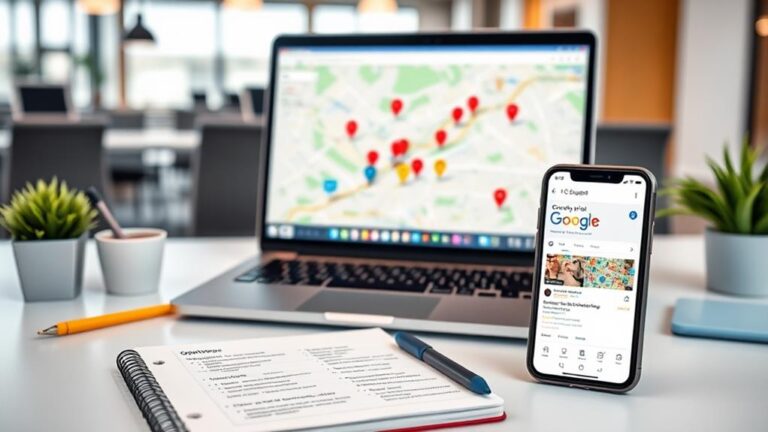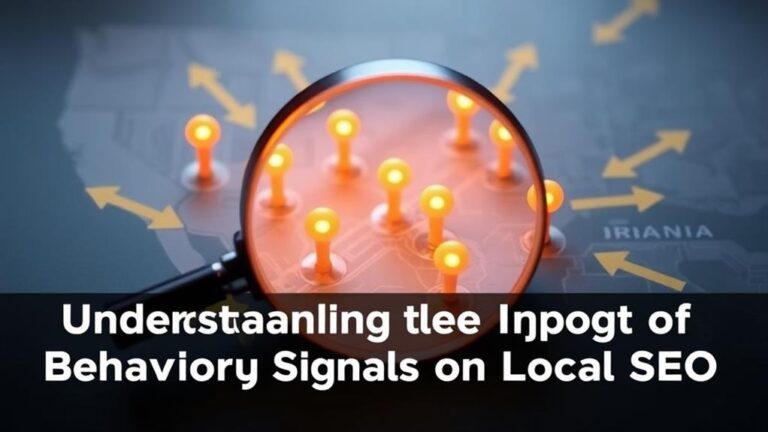About 46% of Google searches are for local info. This fact shows how vital local search optimization is. Especially for promoting local events. With 61% of searches done on mobile devices, it’s key to make your event stand out online.
It’s hard for local events to get noticed online. But using SEO for local events can help a lot. It can make more people come to your event. And it helps get the word out in the community. You can make your event more visible on platforms like Google by improving your event’s website SEO.
We’ll show you how to make your event website better for search engines. You’ll learn how important local SEO is. And how to pick the right keywords and content for your audience. Our tips will help make your event something people don’t want to miss. This can attract more local people and others too.
Understanding the Importance of SEO in Event Marketing
SEO best practices are key for competition and visibility today. Knowing how to optimize search results boosts your event’s success. It draws in more people and increases engagement.
How SEO Elevates Event Marketing
SEO greatly enhances your event’s online visibility. A top spot on search engines leads to 75% of clicks. The first result can get almost all web traffic. Using SEO reaches more people looking for events like yours. It drives organic traffic and spreads the word.
Benefits of Enhanced Visibility
Optimizing search results for marketing brings many perks. First, 53.3% of website traffic comes from organic searches. This makes SEO a cost-effective approach with a high return on investment. Also, being on the first page of results increases your event’s visibility and trustworthiness. This visibility helps people find your event before they see any others. It helps your event grow and become more engaging.
Conducting Effective Keyword Research for Events
Knowing how to do effective keyword research is key for online event visibility. Event organizers need to find what their audience is searching for. This helps them use SEO tactics tailored to their events, making their content easier to find.
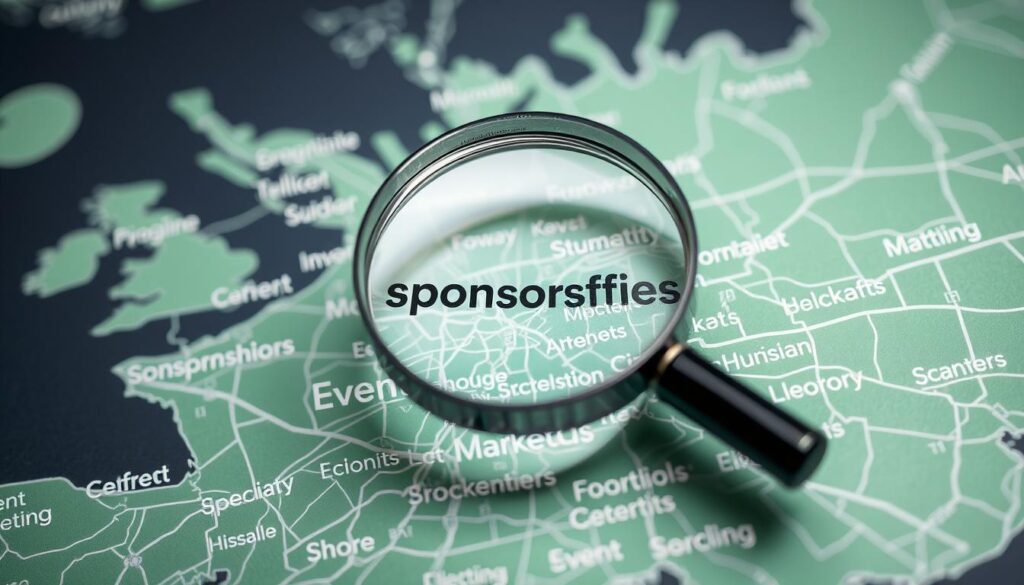
Identifying Relevant Keywords
Good keyword research for events needs a plan. It’s important to look for keywords that a lot of people search for but not many use. These include long-tail phrases that match what users are really looking for, helping you rank higher in searches. For example, “New York tech conference” targets those interested in that specific event.
Using Tools for Keyword Research
There are tools to help find the best keywords. Google Keyword Planner gives details on how many people search for specific keywords and how competitive they are. Event planners can use this info to choose keywords for their event descriptions, titles, and tags.
Using these keywords in your website’s meta descriptions and content matches what users are searching for, boosting click rates. A high click-through rate comes from using the right keywords in your title and description. So, using SEO right can really help more people find your event online.
Optimizing Your Event Landing Page
The landing page is key for an event’s SEO. It should clearly state the event’s name, where it’s happening, and what it’s about. This lets search engines easily sort and rank the page. Using keywords well improves search ranks and matches search engine needs.
Essential On-Page SEO Elements
To get noticed online, key SEO elements are a must. Add your main keywords in the title, meta descriptions, and headers. This grabs both search engines’ and future attendees’ attention. Adding structured data helps search engines better understand your event info.
Creating Compelling Meta Descriptions and Titles
Good meta titles and descriptions help a lot with SEO. They make people want to click by giving a brief event summary. Be sure to include important keywords to help your event show up higher in search results.
Utilizing Quality Content
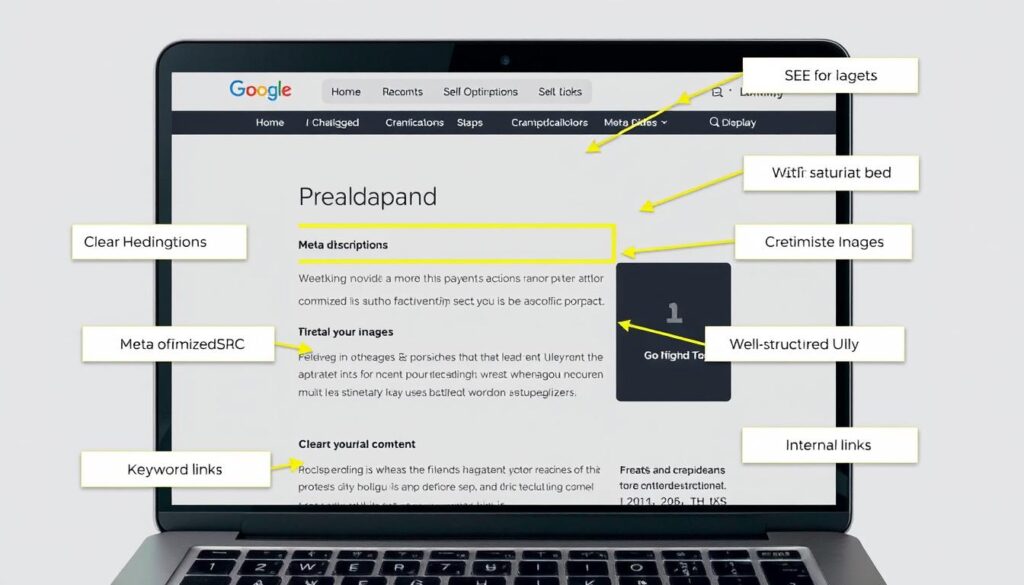
High-quality content is crucial for being seen more online. Your content must be interesting, useful, and relevant. Use great pictures, videos, and infographics to draw people in. Rich content makes 70% of visitors more engaged, boosting ranking and improving their experience. Plus, a .com domain adds trust. 80% of users prefer it.
Learn from the best event pages:
- WPEngine’s Decode virtual developer conference page features several CTA buttons for signup.
- Collision conference includes CTAs and a countdown timer to create urgency.
- Superweek conference provides detailed agenda and travel information, adding credibility.
- Marketing Exchange event exhibits animations and multiple registration CTAs.
- Email Marketing Virtual Event utilizes a speaker carousel and minimal design.
- Adobe’s Digital Experience Conference showcases strong branding and FAQs.
Use these ideas to boost your event’s online presence and attract more visitors.
The Role of Local SEO in Event Promotion
In today’s digital world, local SEO strategy is key for promoting events. It helps increase visibility, draws more people, and strengthens community bonds.
Optimizing for Google My Business
Google My Business (GMB) is vital for local SEO strategy. A complete, current GMB profile helps you show up in local searches. Keep your name, address, and phone number the same everywhere online. This tells Google you’re trustworthy and can improve your rankings.
To make your GMB profile better, you can:
- Add high-quality images
- Get customer reviews
- Update your business hours
- Give detailed descriptions
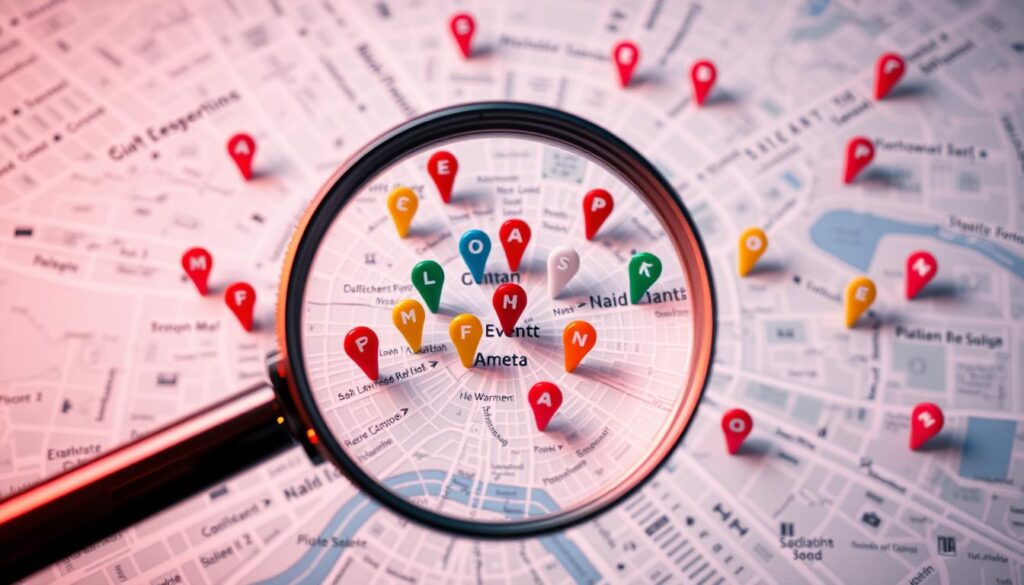
Incorporating Local Keywords
Local keywords are crucial for local SEO strategy. Use location-specific words to draw the right people. Put local keywords in your URL, titles, headers, and content to optimize searches.
Also, make location pages for every area you target. This helps show up in “near me” searches. Nowadays, 57% of local searches come from mobile devices.
To promote events, use social media, offer special discounts, and work with local businesses. These actions help get more online mentions and content, boosting your local online presence.
Sponsorship SEO: Drawing Attention to Your Sponsors
Effective sponsorship SEO boosts an event’s online presence. This increases visibility and engagement. With over 35 years of experience, experts like Zoe Marketing & Communications know how vital it is. They use sponsorships to help both events and sponsors grow.
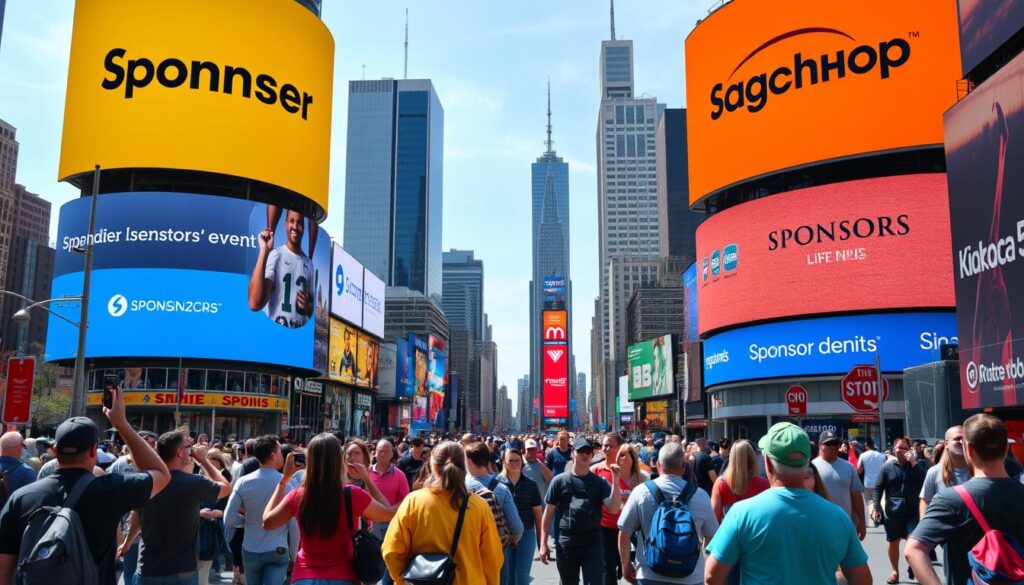
Highlighting Sponsors on Your Event Page
Displaying sponsors on your event page is key. Metro Parent and Chicago Parent did this well with their events. They featured sponsors, improving both visibility and credibility.
Use these methods:
- Include sponsor logos and descriptions to boost recognition.
- Showcase sponsor success stories to build trust.
- Update event pages frequently to keep sponsor details current.
Creating Backlinks Through Sponsor Websites
Backlinks from sponsors’ websites are crucial. They grow your event’s online reach and enhance credibility. For example, the ParentEd Talks series gained from these backlinks. This boosted their search rankings (SERPs).
To get these backlinks:
- Engage in personalized sponsor outreach to discuss backlink opportunities.
- Offer reciprocal linking to add value for the sponsors.
- Monitor and analyze backlink performance to adjust strategies as needed.
Also, start seeking local sponsors right after an event ends. This gives you time to build connections and secure partnerships.
Leveraging Social Media for Local Event SEO
In today’s world, using social media can help your local event get noticed. Websites like Facebook and Twitter let you talk directly to local people. They help create excitement for your events. This approach increases your local presence online, attracts more participation, and can improve your position in search results.
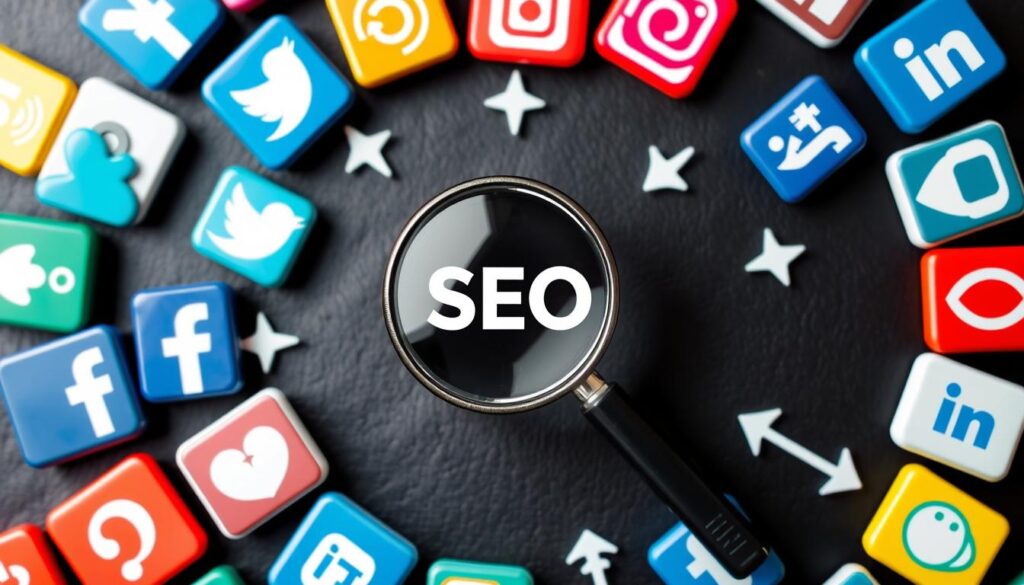
Engaging with Local Audience
Connecting with locals means sharing content that matters to them. Post stories, updates, and info about your event. This builds community spirit. Make sure your business’s name, address, and phone number are the same everywhere online. Using these methods can lead to a 40% jump in visitors from search engines.
- Post regularly about upcoming events
- Respond promptly to comments and messages
- Encourage users to share their experiences and reviews
- Host live Q&A sessions about the event
Using Hashtags and Geotagging
Using hashtags and locations in your posts can make your event stand out locally. Tags like #NYCbakeries attract people near you. Adding the event’s location helps show your post in local searches. For instance, a bakery got more local attention by using specific hashtags related to their area.
Best Practices:
- Use popular local hashtags related to your event
- Geotag posts so they get found in local searches
- Keep an eye on trending tags and join in
- Ask event-goers to use hashtags made for the event
Focusing on connecting with your local community through social media is key. Using hashtags and locations correctly boosts your event’s local SEO. This strategy helps you reach more people, engage with your community, and increase website visits and participation.
Monitoring and Analyzing SEO Performance
To get better at SEO, you need to watch and study it closely. Checking the data often helps you see if what you’re doing works. It shows what needs to be changed to do better.
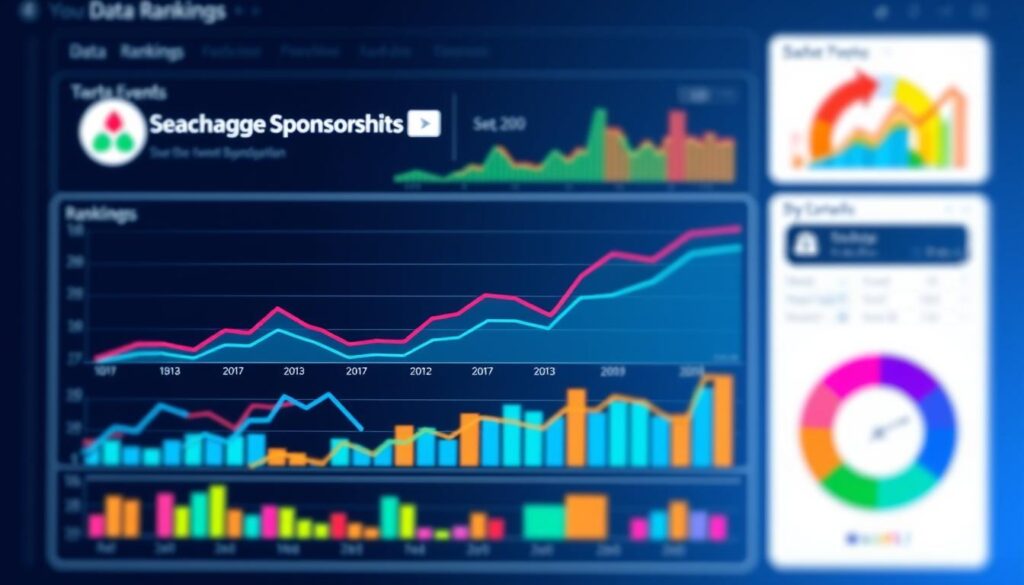
Using Tools Like Google Analytics
Google Analytics is a great tool for keeping an eye on SEO. It shows how much traffic you get, who visits your site, and how they act. With this info, you can see what’s working and what’s not. Adding tools like Google Search Console helps even more. It finds problems and gives tips to get better.
Adjusting Strategies Based on Performance Data
To improve SEO, you must look at the data and understand what it means. Changing your SEO plan based on what the data shows is key. If a keyword doesn’t bring visitors, you might need new content or another keyword. Learning how users act helps you make content they like. This keeps them on your site longer and leads to more actions. Keeping an eye on SEO regularly and checking out the competition helps your site stay seen. It matches what users want and how search engines work.
Conclusion
SEO is key for local events to get seen and trusted more. It involves aligning marketing with local online searches and keeping event information highly visible. It’s crucial to do thorough keyword research, use Google My Business (GMB) well, create strong content, and check on your SEO’s success regularly.
More people now look up local events on their phones, leading to more in-person visits. This shows how important local SEO is for making sure your event gets noticed. Google gives local listings a high spot in search results. This is because local searches often lead to real-world purchases.
Building a strong local presence involves more than just local SEO. Listing your event in local directories and getting good online reviews are part of it. Also, working with other local businesses can help a lot. Supporting local events can make your brand more visible, improve community ties, and open up opportunities for new business connections. Keeping an eye on your SEO performance with tools like Google Search Console is also key. This lets you see what’s working and what’s not, helping you improve your strategy.


